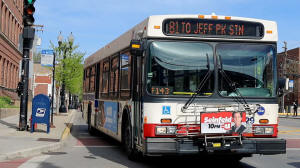Lawmakers ‘ready to move’ on transit reform, but funding agreement
remains elusive
[October 08, 2025]
By Ben Szalinski
SPRINGFIELD — Illinois lawmakers will return to Springfield next week
hoping to resolve a major unchecked box from the spring: Keep the trains
in Chicago running.
As the spring legislative session concluded, lawmakers were anticipating
a $771 million shortfall for Chicagoland transit agencies beginning next
calendar year. But just last week, as lawmakers readied to return to the
Capitol for a two-week fall session beginning Tuesday, Oct. 14, the
Regional Transportation Authority released a report saying they now
anticipate the 2026 deficit to be just $202 million.
While that estimate theoretically gives lawmakers more breathing room,
many say they’re ready to put the issue to rest and provide transit
agencies and riders certainty that service won’t be slashed next year.
“The cliff is coming,” Rep. Eva-Dina Delgado, D-Chicago, the House
Democrat leading transit reform, told Capitol News Illinois. “It’s
coming either in July or maybe it’s coming in October for Metra, and
maybe it’s coming in (20)27 for Pace. But it’s coming. And I just think
that we’re at a point right now where we’re ready to move.”
Stakeholders still have to agree on two major facets: a funding source
and governance changes. While there is more agreement among stakeholders
on reforms than funding, it’s unlikely lawmakers will move one without
the other.
“The reforms are easy to vote for,” Illinois AFL-CIO President Tim Drea
told Capitol News Illinois. “The funding is not. So, if people are going
to stand up and say, ‘I support public transit,’ they have to support it
100%, not just a little bit.”

The General Assembly failed to advance a reform and funding plan before
they adjourned at the end of May. While the Senate approved a plan that
included a controversial per-package delivery fee, the House didn’t
consider it before adjourning the summer.
Stakeholders noted urgency is heightened by other upcoming potential
funding issues, such as the federal government’s dialing back of
Supplemental Nutrition Assistance Program and Medicaid funding.
“With those discussions going on, if we could get transportation solved
in the veto session, we think that the state would be much better off,”
Drea said.
Latest shortfall estimate
The impending deficits are driven by the fact that COVID-19 pandemic-era
aid programs will be fully depleted by 2027.
“We have stretched our federal COVID relief dollars to last longer than
almost any system in the nation,” RTA Chair Kirk Dillard said in a
statement. “Independent agencies rank the RTA system as the most
efficient in the country. The responsibility now lies with Springfield.”
RTA’s latest estimate projects that the deficit will reach $789 million
in 2027 and $888 million in 2028.
RTA claimed during a meeting last week that the new estimate was driven
by better-than-expected sales tax revenue. That was the result of a new
law taxing online purchases shipped to Illinois from other states and a
$74 million fund transfer from Metra and Pace to the Chicago Transit
Authority. The CTA now anticipates that it won’t reach a funding
shortfall until the middle of next year, meaning lawmakers don’t have to
pass new reform this month.
Some have criticized the timing of RTA’s latest estimate, arguing it
downplays the urgency to pass reform.
“I’m glad cost controls and stronger receipts helped — but a shift that
big, that fast, is exactly why we need guardrails, transparency, and
real reform,” Rep. Kam Buckner, D-Chicago, said in a statement.

Still, the latest estimates theoretically buy lawmakers time. According
to the RTA, the CTA would run out of funding in the middle of 2026,
followed by Metra near the end of the year and Pace in 2027.
But the RTA is slated to adopt its 2026 budget in December, meaning it
will have to include contingency plans such as fare hikes if the state
doesn’t provide more funding. The CTA would also institute a hiring
freeze in the first quarter of 2026 and layoffs would begin in the third
quarter.
Pennsylvania is offering Illinois lawmakers a preview of what would
happen if they don’t address the cliff. Pennsylvania’s legislature has
been locked in a budget impasse for months and hasn’t been able to agree
to transit reform, leading Philadelphia’s transit agency to make major
service cuts. Delgado said Pennsylvania’s situation “is giving a lot of
clarity” to Illinois lawmakers “about what we don’t want to do.”
How to close the funding gap
Delgado said lawmakers are on the “2-yard line,” but she declined to
rule out any specific taxes from the final product.
“When I think about revenue for transit, I want it to be sustainable,”
she said. “I want it to be something that’s related to transportation,
and I want it to be something that grows over time.”
The plan passed by the Senate in May but not the House included a $1.50
fee on online home delivery orders across the state, a tax on real
estate transfers in Cook County and the surrounding counties, a tax on
taxi and rideshare services, and a statewide 3 cents-per-kilowatt hour
charge for charging electric vehicles. It added up to $1.5 billion of
new revenue that advocates say is necessary to not just fix the funding
problem but improve the system.
Delgado didn’t give specifics, but she said lawmakers are looking at
“all the different ways that you can slice and dice those revenues” to
fund the system.

[to top of second column]
|

A Chicago Transit Authority bus leaves a stop on the city’s North
Side. (Capitol News Illinois photo by Andrew Adams)

Labor unions are adamantly opposed to using money from the state’s road
fund that pays for transportation capital projects or raising tolls to
pay for public transit. Other than that, they are generally open to most
other ideas.
“We know that (funding transit) would be very, very difficult to do with
any one source, so we’re very supportive of a lot of the sources out
there on the table,” Drea said.
Delgado said preserving free, reduced-fare and paratransit rides is also
a major priority and added it is a key sticking point in negotiations
over funding.
Rep. Brad Stephens, R-Rosemont, told Capitol News Illinois lawmakers
need to first address the initial cliff before imagining ways to use new
funding.
Another cause for urgency is the time it takes for the state to
implement and collect a new tax. If lawmakers wait too long, new
taxation measures might not be up and running by the time the cliff
arrives.
Bipartisan talks
Stephens is the only Republican who participates in the House Democrats’
working group on public transportation reform.
“I’m just trying to be open-minded while being Republican and not
necessarily being in favor of tax increases,” Stephens said. “But
without the transit mechanisms to get people to work, those businesses
are going to have troubles as well.”
Chicago’s transit agencies aren’t the only ones in Illinois facing
financial troubles. Downstate agencies are also running short on money
as their sales tax-based funding formula becomes less lucrative.
The state covers up to 65% of operating expenses for all downstate
transit agencies. But because of rising costs and lackluster economic
growth in downstate communities that hinder sales tax revenue, funding
shortfalls are growing. Combined with slower property tax growth outside
the Chicago area, those economic factors make it hard for local
governments to cover 35% of public transportation costs.

“I think that that’s important in crafting the piece of legislation to
make sure that all of those transit agencies are involved in the process
and that there’s something in it for everybody,” Stephens said. “Again,
maybe not everybody is going to get 100% of what they’re looking for.”
Delgado said she hopes to get bipartisan support on the final bill,
which she said will include reforms for downstate agencies, many of
which are in Republican districts.
“Transit is not a partisan issue,” she said. “It affects people
regardless of what ballot you pull.”
Stephens said more suburban representation on a new governing board and
guardrails on how revenue will be used will be necessary to get GOP
support for the bill.
Changing to the governing system
Democrats are largely in agreement about how to reform the governing
structure of the systems. While it’s not finalized, sources said the
plan would be similar to what the Senate passed in May.
The bill would rename the RTA the Northern Illinois Transit Authority,
which would have total control over fares. The board would include five
members appointed by the governor, five by the president of the Cook
County Board, five by the mayor of Chicago and one person each from
Lake, McHenry, Kane, DuPage and Will counties.
Many suburban leaders and legislators say they are worried the plan
dilutes suburban representation in favor of Chicago.
“We don’t want to make this a Chicago versus the suburbs issue, but
we’ve also got to make sure that there’s safeguard to make sure that
Chicago doesn’t control all of the revenue, the new revenue,” said
Stephens, who is also the mayor of Rosemont and the only Republican
lawmaker whose district includes part of Chicago. “We’ve got issues in
the suburbs as well, so we need to make sure we address that.”

But Democrats argue the governor’s appointees won’t necessarily come
from the city and the board’s voting thresholds will ensure a block of
Chicago- and Cook County-appointed board members can’t unilaterally make
decisions.
“I think that the leaders who are making these appointments are going to
have a very regional perspective,” Delgado said. “They’re going to want
to have people that take all of the interests of the region into account
before making any decisions.”
There is also broad agreement about addressing public safety problems.
Delgado said lawmakers are looking at creating a law enforcement task
force and the future NITA board will be able to decide the best approach
to public safety. Some groups have proposed creating a new police force
that would focus on public transportation.
“That’s one of the reasons why we need additional funding more than what
the fiscal cliff stands for,” Drea said. “But if we get that, people
will return” to riding the system.
Capitol News Illinois is
a nonprofit, nonpartisan news service that distributes state government
coverage to hundreds of news outlets statewide. It is funded primarily
by the Illinois Press Foundation and the Robert R. McCormick Foundation. |